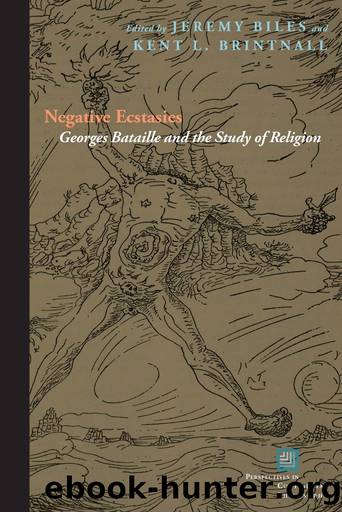Negative Ecstasies by Biles Jeremy;Brintnall Kent L.;

Author:Biles, Jeremy;Brintnall, Kent L.; [Biles, Jeremy]
Language: eng
Format: epub
ISBN: 9780823265190
Publisher: Fordham UP
Published: 2015-09-15T00:00:00+00:00
Bataille is especially sophisticated here, for he does not imagine one set of poles without the other. In a word, his thought is rigorously dialectical. He invokes Hegel to acknowledge this, and it is clear that, as William James had earlier intuited of Hegel (in a state induced by nitrous oxide), Bataille sees the Hegelian dialectic as essentially mystical in structure and intent.15 And why not? According to Bataille, Hegel drew his knowledge of the dialectic from figures like Meister Eckhart and Jacob Boehme.16 Hence lines like this one: âWe are faced with the paradox of an object which implies the abolition of the limits of all objects, of an erotic object.â17
In this same dialectical spirit, Bataille observes that transgression derives its power from the taboo; that the transgression does not remove the taboo but suspends, completes, and transcends it; and that taboos were put in place very early in the development of human society in order to enable work and the construction of a social order.18 Humanity, in fact, begins for Bataille in the act of saying âNoâ to the superabundance, violence, and nonrational, nonpragmatic nature of the real.19 Similarly, sexual taboos must not be misunderstood as simple superstitions. We cannot get rid of them, as our humanity depends on them.20 In a similar spirit again, he is also constantly reminding his readers that the dynamics of sexual arousal and desire depend on the taboo, on the forbidden and the hidden.
Once these dialectical binaries are set up, the question immediately arises how an individual or community might attempt to pass from the list on the left to the list on the right. We can isolate at least four basic answers to this question: one metaphysical, one sexual, one spiritual, and one ritualâthat is, death, eroticism, mysticism, and sacrifice.
Death. For Bataille, death is quite simply the return of a discontinuous being back into the continuity of being, which remains completely unaffected by the death of individuals.21 We come and go. Reality remains what it is, always and everywhere.
Eroticism. Sexuality mirrors or replicates this death-as-continuity both biologically and psychologically. Biologically speaking, sexuality is clearly aimed at reproduction, and reproduction is the flipside of death (since without death there would be no need to reproduce). So sexuality brings more discontinuous beings into existence even as it arises from the fact that all of these beings will be absorbed back into continuity (the dialectic again). Psychologically speaking, sexuality is not eroticism. Eroticism is a much more complex and fundamentally human phenomenon for Bataille to the extent that it secretly seeks a temporary dissolution of those human constructions we call selfhood and society. This desire for continuity is signaled in the âdecisive actâ of stripping naked and the âobsceneâ intuition of âa sense of a state of continuity beyond individuality,â but it finds its fullest expression in the sexual ecstasy of orgasmâthat âlittle deathâ of which the French so accurately speak.22 (English speakers, we might answer back with a grin, possess their own linguistic intuitions, with a more theological ejaculation: âOh God, oh God, oh God!â)
Mysticism.
Download
This site does not store any files on its server. We only index and link to content provided by other sites. Please contact the content providers to delete copyright contents if any and email us, we'll remove relevant links or contents immediately.
| Baha'i | Cults |
| Demonology & Satanism | Eckankar |
| Egyptian Book of the Dead | Freemasonry |
| Messianic Judaism | Mysticism |
| Scientology | Theism |
| Tribal & Ethnic | Unitarian Universalism |
The Four Agreements by Don Miguel Ruiz(6322)
Breaking Free by Rachel Jeffs(4013)
The Hatha Yoga Pradipika (Translated) by Svatmarama(3077)
120 Days of Sodom by Marquis de Sade(2943)
Member of the Family by Dianne Lake(2262)
The Tao of Physics by Fritjof Capra(2168)
The Psychedelic Gospels: The Secret History of Hallucinogens in Christianity by Jerry B. Brown(2073)
The Road to Jonestown by Jeff Guinn(1983)
Going Clear: Scientology, Hollywood, and the Prison of Belief by Lawrence Wright(1884)
Going Clear by Lawrence Wright(1873)
Uriel's Machine by Christopher Knight(1823)
The Grand Grimoire: The Red Dragon by Author Unknown(1711)
The Gnostic Gospel of St. Thomas by Tau Malachi(1680)
Key to the Sacred Pattern: The Untold Story of Rennes-le-Chateau by Henry Lincoln(1556)
The Malloreon: Book 02 - King of the Murgos by David Eddings(1518)
Waco by David Thibodeau & Leon Whiteson & Aviva Layton(1488)
The New World Order Book by Nick Redfern(1485)
The Secret of the Temple by John Michael Greer(1422)
The Initiatory Path in Fairy Tales by Bernard Roger(1395)
